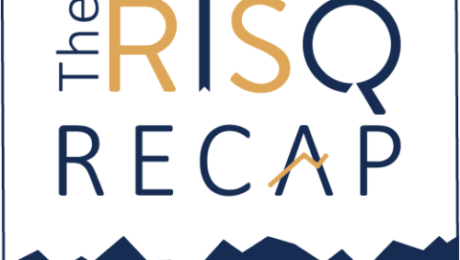The RISQ RECAP:
February 20th – February 24th, 2023
Each week, you’ll find specially curated news articles to keep you up to date on the ever-evolving world of insurance and risk management. The articles are divided out between items relevant to Property & Casualty, Employee Benefits/Human Resources, and Compliance. We’ve included brief summaries of each item as well as a link to the original articles.

PROPERTY & CASUALTY
Hopeful Cannabis Sales Data an Encouraging Sign for Insurance Specialists
“News has been rife with dreary tidings for the cannabis industry over the past year, but a surprisingly encouraging outlook has emerged among the persistent din of downward harbingers like a flower glut, investment funding shrinkage, and layoffs. Industry sales are expected to continue to rise this year – though not so much for those focused on the Western U.S., where most of the nation’s mature markets are and new data points to negative short-term trends. Beneath it all, both the good and bad in the data may ultimately be positive indicators for insuring cannabis specialists, according to two brokers who have been in the space for years. U.S. legal cannabis sales may grow 14% by year’s end, while overall global growth and spending is on track to yield a market size of $59.6 billion by 2027, a report out today from market intelligence and data provider BDSA shows.” Full Article
– Insurance Journal

EMPLOYEE BENEFITS, HUMAN RESOURCES, & COMPLIANCE
Employers, Do No Delay in Responding to A Request for Reasonable Accommodation “When dealing with a request for reasonable accommodation, “an indeterminate delay has the same effect as an outright denial,” as the U.S. Court of Appeals for the Second Circuit recently noted.” Full Article – Shawe Rosenthal LLP
DOL Clarifies Whether FLSA and FMLA Protections Apply to Remote Employees “The U.S. Department of Labor (DOL) recently issued new guidance regarding how remote employees should be paid under the Fair Labor Standards Act (FLSA) and when they are eligible for leave under the Family and Medical Leave Act (FMLA).” Full Article – Phelps Dunbar LLP
ADA and Hearing Disabilities in the Workplace “The Equal Employment Opportunity Commission (EEOC) issued new technical assistance, “Hearing Disabilities in the Workplace and the Americans with Disabilities Act,” addressing how the Americans with Disabilities Act (ADA) applies to job applicants and employees with hearing disabilities.” Full Article – Jackson Lewis P.C.
EEOC Continues to Prioritize its Focus on the Use of Artificial Intelligence in Employment Decisions “The EEOC first announced its Artificial Intelligence initiative in 2021. The initiative was created to ensure the use of software, including AI and other technologies used in employment decisions, comply with the federal employment laws it is tasked with enforcing.” Full Article – Baker, Sterchi, Cowden & Rice LLC
4 Tips to Avoid (Or At Least Dull) Headaches When Conducting Layoffs in the US “As we find ourselves firmly in the middle of Q1 of 2023, the avalanche of layoff headlines that started last quarter just keeps coming. Whether you follow the school of thought that the US entered a recession in summer of 2022 (after two consecutive quarters of negative gross domestic product) or not (given a strong labor market and corporate earnings growth), more and more companies are having to address overzealous pandemic hiring and the backlash from soaring company valuations.” Full Article – Baker & McKenzie LLP
No Dogs Allowed: Federal Court Rejects Service Dog Accommodation in Hospital Setting “Most of us know that when an employee or visitor to a place of public accommodation requests a reasonable accommodation, the ADA requires an interactive process to make an individualized determination. But what about a request from a nursing intern to bring her service dog… to a hospital… around patients? Could this qualify as a reasonable accommodation? In Bennett v. Hurley Medical Center, one federal just says, “not always.” Full Article – Bradley Arant Boult Cummings LLP

STATE & INTERNATIONAL COMPLIANCE
In addition to the RISQ Review, RISQ Consulting also provides a resource that features changes and updates to State and International Compliance measures. We’ve included brief summaries of each item below, and also provided links to the original articles if you’d like to read further.
New York State Legislature Proposes Amendments to Pay Transparency Law Taking Effect This Year “The most notable revision would provide that the law applies to remote positions physically performed outside of New York that report to a New York supervisor, office, or work site. The bill is currently before Governor Hochul, and if signed, would become part of the law taking effect in September.” Full Article – Proskauer Rose LLPNEW YORK
Illinois Equal Pay Certification: A Practical Guide for Employer Compliance “The EPA Amendments make the Illinois Equal Pay Act one of the most demanding pay transparency statutes in the country because it requires employers with 100 or more employees in Illinois to submit employee pay data and a signed compliance statement to obtain an Equal Pay Registration Certificate (EPRC).” Full Article – Littler Mendelson P.C.ILLINOIS
Impact of New Jersey’s Just-Signed Temporary Workers’ Bill of Rights “On February 6, 2023, New Jersey Governor Phil Murphy signed into law A1474/S511, commonly referred to as the “Temporary Workers’ Bill of Rights.” The bill offers additional compensation, benefits and protections for temporary workers, with the cost and burden of compliance placed on employers and staffing agencies that place temporary workers.” Full Article – Greenbaum Rowe Smith & Davis LLPNEW JERSEY
Connecticut Expands Employment Anti-Discrimination Protections “The Connecticut Fair Employment Practices Act (CFEPA) prohibits discrimination based on many protected characteristics, such as race, age, gender, gender identity, religion, and disability. The CFEPA is broader than federal anti-discrimination laws in both scope (it covers more categories of employees) and reach (it applies to more employers).” Full Article – Day Pitney LLPCONNECTICUT
Ninth Circuit Reverses Itself and Strikes Down California Law Targeting Mandatory Employment Arbitration Agreements “In a reversal of its prior ruling, the Ninth Circuit recently held that the Federal Arbitration Act (FAA) preempts California Assembly Bill 51 (AB 51), a 2019 measure that aimed to bar employers from entering into new agreements—or extending previous ones—requiring job applicants or workers to arbitrate claims under the California Labor Code or California Fair Employment and Housing Act (FEHA).” Full Article – Morrison Foerster P.C.CALIFORNIA
- Published in Blog
Report: Managers Impact Employee Mental Health More Than Doctors, Therapists
This article is from RISQ Consulting’s Zywave client portal, a resource available to all RISQ Consulting clients. Please contact your Benefits Consultant or Account Executive for more information or for help setting up your own login.

A new report from The Workforce Institute at UKG revealed that managers impact employee mental health more than doctors and therapists. The study conducted for the report surveyed 3,400 people in 10 countries, including the United States, to explore mental health in and outside work.
Not surprisingly, work impacts employee mental health, and organizational leaders and managers can be critical in supporting workers. Consider the following key findings from the report:
- Work influences mental health the most, according to 60% of employees.
- Managers impact employee mental health (69%) more than doctors (51%) or therapists (41%).
- Managers have just as much an impact on employee mental health as a spouse or partner (69%).
- Mental health is valued over a high-paying job by most employees (81%), and 64% would take a pay cut for a job that better supports their mental wellness.
- Work stress negatively impacts employees’ home life (71%), well-being (64%) and relationships (62%).
The research also revealed that managers are often more stressed than their team members and senior leadership. Companies are encouraged to be inclusive with mental health support and not forget about managers in their efforts.
“Being overwhelmed consumes human energy and impacts retention, performance, innovation and culture. Employers can be the anchor of stability for their people by giving them the support and resources they need—not just what we think they need.”
– Jarik Conrad, executive director of The Workforce Institute at UKG
What Can Employers Do?
Workers want their employers and managers to do more to support mental health. They are also willing to make trade-offs for their mental health, as nearly two-thirds of employees would take a pay cut for a job that better supports their mental health. Fortunately, managers can play a vital role in supporting employees, which can bolster employee attraction and retention efforts. Employers can create supportive work environments by being authentic, building empathy and listening actively to employees.
Contact RISQ Consulting for additional mental health and employee communication resources.
- Published in Blog
Why You Should Care About the End of COVID-19

By Ashley Snodgrass, Employee Benefits Analyst
The end of COVID has been up for debate. Some people feel as though the pandemic was over when the mask mandates went away, while others think the pandemic ended as soon as vaccines were available. And then there are some super rosy people who say the pandemic will never be over! What is the truth?
One way to look at the end of COVID-19 is to recall the start of the pandemic. On January 31, 2020, Secretary of Health and Human Services, Alex Azar, declared a public health emergency due to confirmed cases in the United States of the 2019 Novel Coronavirus. This official order stated the public health emergency has existed since January 27, 2020. After a long and interesting three years, the Biden Administration is ready to end the public health emergency on May 11, 2023. Even though life has resumed some semblance of a “new normal” for many people, the end of this public health emergency will still have some meaningful impacts for health plans.
For example, health plans will no longer have to cover COVID-19 testing with no member cost sharing. Also, health plans will only be required to cover in-network COVID-19 vaccines, similar to other preventive services requirements. Health plans that offer COBRA coverage must ensure that regular deadlines resume too – such as the 60-day election period for COBRA.
I would recommend that you review this handy document from Zywave for a detailed account of all the changes that will be triggered by the end of the public health emergency. Don’t let these end-of-pandemic changes catch you as off guard as the start of the pandemic.
For questions about what this could mean for your organization, please contact your RISQ Employee Benefits Consultants or Account Executive, or info@risqconsulting.com.
- Published in Blog
The RISQ RECAP:
February 13th – February 17th, 2023
Each week, you’ll find specially curated news articles to keep you up to date on the ever-evolving world of insurance and risk management. The articles are divided out between items relevant to Property & Casualty, Employee Benefits/Human Resources, and Compliance. We’ve included brief summaries of each item as well as a link to the original articles.

PROPERTY & CASUALTY
Google Case at Supreme Court Risks Upending the Internet as We Know It
“An upcoming Supreme Court case could answer one of the toughest questions of the internet age: Should online companies be held responsible for promoting harmful speech? The case, Gonzalez v. Google, could upend the modern internet economy, sparing no online business. A ruling against Google will likely leave internet companies — from social media platforms to travel websites to online marketplaces — scrambling to reconfigure their businesses to avoid costly lawsuits.” Full Article
– Insurance Journal

EMPLOYEE BENEFITS, HUMAN RESOURCES, & COMPLIANCE
Texas District Court Once Again Vacates Departments’ No Surprises Act Regs “Health providers asserted that the regulations improperly limited arbitrators’ discretion and improperly weighted the QPA (by making it the ‘de facto benchmark’ for OON reimbursement). The district court concluded that the final regulations’ challenged provisions exceeded the Departments’ authority and conflicted with the NSA.” Full Article – Thomson Reuters Practical Law
Healthcare Plans After Dobbs: What Employers Need to Know “In an age of remote work, even employers based in states such as California where the right to – Boutwell Fay LLP
abortion healthcare has been confirmed, may have employees working remotely in other states which have restrictive abortion laws. Set up a system to monitor legal developments in this area, at the
state, local, and federal levels. Review all relevant plan documents. Consider new plans/plan designs. Review applicable leave laws.” Full Article
Agencies Propose Expansion of Contraceptive Care Coverage “The proposal would create a mechanism, independent from the employer, group health plan, plan sponsor, institution of higher education, or issuer, through which individuals could obtain contraceptive services at no cost from a willing provider of contraceptive services when the employer does not elect the optional accommodation.” Full Article – The Wagner Law Group
Public Health Emergency Ends May 11: What Telehealth Companies Need to Know “While some telehealth waivers will survive the end of the public health emergency (PHE), not every pandemic-era policy will continue. Digital health companies relying on the PHE waivers – Foley and Lardner LLP
should take steps now to bring operations into compliance with the post-PHE world before the PHE ends in May.” Full Article
HHS Fact Sheet: COVID-19 Public Health Emergency Transition Road Map “HHS continues to review the flexibilities and policies implemented during the COVID-19 PHE to determine whether others can and should remain in place, even for a temporary duration, to facilitate jurisdictions’ ability to provide care and resources to Americans. Still, others will expire. This Fact Sheet includes a list of some of the changes people will see in the months ahead.” Full Article – U.S. Department of Health and Human Services
Employers Prepare for Thawing ERISA Deadlines “Although the end of the outbreak period will be the same for each participant and beneficiary, not every deadline will be due to the mass nature of the timeframe beginning dates (the end of the outbreak period), employers, their third-party administrators, COBRA administrators, and other service providers may end up dealing with several ‘batched’ requests from participants, especially for some of the shorter deadlines and more common requests such as HIPAA special enrollment applications and COBRA elections.” Full Article – Ogletree Deakins

STATE & INTERNATIONAL COMPLIANCE
In addition to the RISQ Review, RISQ Consulting also provides a resource that features changes and updates to State and International Compliance measures. We’ve included brief summaries of each item below, and also provided links to the original articles if you’d like to read further.
Gainesville First City in Florida to Pass Fair Chance Hiring Law Restricting Private Employers’ Use of Criminal History “In light of these changes, covered employers with operations in Gainesville that use criminal records to vet candidates should consider a privileged review of their policies, procedures, and other documents related to the screening process.” Full Article – Littler Mendelson P.C.FLORIDA
St. Paul & Bloomington, Minnesota Amend Their Sick and Safe Time Ordinances “On January 19, 2023, St. Paul, Minnesota Mayor Melvin Carter signed into law amendments to the Earned Sick and Safe Time (ESST) Ordinance, which will take effect 30 days later, on February 18, 2023. Four days later, on January 23, Bloomington enacted amendments to its forthcoming ESST Ordinance that will, like the law itself, first take effect on July 1, 2023.” Full Article – Littler Mendelson P.C.MINNESOTA
2022 Connecticut Employment Law Recap “The past year has been filled with employment law developments in Connecticut. Below are summaries of some of the key laws that were passed or went into effect in 2022, with which Connecticut employers should be sure to comply in 2023.” Full Article – Day Pitney LLPCONNECTICUT
Illinois Legislature Passes Mandatory Paid Leave for Any Purpose, to be Effective in 2024 “The new law would require nearly all Illinois employers to provide employees with up to 40 hours of paid leave per year. Assuming it is signed, this requirement will be effective in January 2024, and the paid leave will be able to be used for any purpose.” Full Article – Levenfeld Pearlstein P.C.ILLINOIS
Not so FAST– AB 257 on Hold Pending Voter Referendum in 2024 “On January 24, 2023, the California Secretary of State completed its verification process and qualified a referendum challenging Assembly Bill (AB) 257, also known as the FAST Recovery Act for the November 2024 ballot. In the meantime, the law will not take effect unless it is approved by voters in the November 2024 election.” Full Article – Jackson Lewis P.C.CALIFORNIA
- Published in Blog
Minimum PTO Policies
This article is from RISQ Consulting’s Zywave client portal, a resource available to all RISQ Consulting clients. Please contact your Benefits Consultant or Account Executive for more information or for help setting up your own login.

Many employees do not use their allotted paid time off (PTO) despite their employers’ vacation and other leave policies. As a result, some employers are implementing minimum PTO policies to address this challenge. This emerging trend takes standard PTO policies one step further by mandating that employees take off a minimum number of days each year. When done properly, minimum PTO policies can help curb employee burnout, improve workplace productivity and strengthen attraction and retention efforts.
This article explores minimum PTO policies, including the potential benefits and organizational considerations for developing and implementing these policies.
What Is Minimum PTO?
Minimum PTO—also known as mandatory vacation or time off—is a policy that requires employees to take a minimum number of vacation days each year. While minimum PTO policies can vary by duration and the amount of time employees can take off, they generally take the form of an annual time-off minimum. These policies can establish deadlines for employees to use their PTO monthly, quarterly, seasonally or annually. Employees continue to receive their regular wages when taking time off.
Some employers require employees to take a portion of their minimum PTO over multiple consecutive days. This is known as a consecutive-day policy. For example, an employer may require employees to schedule five of their allotted 15 PTO days consecutively. This helps ensure that employees disconnect from work while away from the office, allowing them to use their PTO for something meaningful and return to work recharged. Consecutive day policies may also allow employees to take time off in smaller increments as long as they take one larger block of PTO each year.
Potential Benefits of Minimum PTO
Many savvy employers are transitioning to minimum PTO to help their employees feel happier and more satisfied at work, which can increase workforce productivity and reduce turnover. Minimum PTO not only encourages employees to use their allotted time off, but it can also strengthen organizations. The following sections highlight some benefits of implementing minimum PTO policies.
Improved Employee Well-being
Employees are an organization’s most valuable resource. By requiring employees to use their PTO, employers prioritize their workers’ mental and physical well-being. Minimum PTO can also help organizations strengthen employee loyalty since it can signal to workers that they’re not required to be online or work outside of expected hours. This can lead to employees feeling valued and, therefore, improve morale. Additionally, because minimum PTO policies help employees recharge, they can improve workplace productivity and safety. A rested workforce will likely be more creative, focused and careful.
Workforce Needs Evaluation
Mandatory PTO allows organizations to evaluate their workforce needs and reveal potential issues. By requiring employees to take time off, employers can learn whether a particular employee is taking on too many responsibilities and if they need to hire additional workers. It can also encourage cross-training by allowing workers to take on new responsibilities and gain experience when their colleagues are away. This can enable knowledge transfer among workers and decrease the risk of losing vital information and experience when an employee leaves. Additionally, since minimum PTO requires all employees to take time off, it can provide employees with opportunities to report workplace issues that they might not otherwise do due to fear or intimidation, such as harassment and bullying.
Reduced Cashflow and Rollover Issues
Minimum PTO policies can provide a positive alternative to use-it-or-lose-it PTO policies. Many regular PTO policies allow employees to cash out or roll over unused PTO at the end of the year. Cash-outs can create cashflow problems for employers, and rollovers can lead to scheduling challenges the following year. Minimum PTO policies can help organizations save money on year-end PTO payoffs by avoiding cash-outs entirely and limiting potential scheduling issues from rollovers.
Alternatives to Unlimited PTO Policies
Unlimited PTO can be a great recruitment tool and may seem ideal for employees, but, in reality, it can be problematic. Employees often struggle to strike a balance between an acceptable amount and an excessive amount of PTO under unlimited policies. As a result, many employees take less time off than they would if their employers adopted minimum PTO policies. As a result, unlimited PTO can cause employee burnout, decreased worker productivity and increased turnover.
Additionally, unlimited PTO policies can be ambiguous or poorly designed, making it more difficult for employees to take time off. Some organizations may have unspoken rules about using unlimited PTO. This is common in industries with demanding work cultures, like banking and finance. These unspoken norms often dissuade employees from taking time off because they may feel unsure or guilty about stepping away from work. By requiring employees to take time off, employers signal to workers and applicants that they value work-life balance, which can improve overall attraction and retention efforts.
Considerations for Implementing Minimum PTO
While minimum PTO can help employees feel happier and more satisfied at work, adopting this approach can create scheduling challenges. Minimum PTO policies require employers to plan ahead because they must address situations where employees may be out for multiple days. In addition to potential scheduling issues, minimum PTO can create hardships for employees by requiring them to increase their workloads when their coworkers are away. This is especially true for small teams and businesses. Employers can address these issues by establishing PTO blackout periods during peak times or predictable busy seasons. They can also train managers to address PTO requests during popular times, such as during the summer and holidays.
When establishing policies regarding PTO usage and blackout periods, employers need to be consistent with how they administer and approve time-off requests. Employers can do this by establishing a written minimum PTO policy that provides employees with details about how to use and request time off. This can include the minimum number of days employees must use each year, whether any days need to be consecutive and the deadlines for using PTO (e.g., monthly, quarterly and annual).
Organizations need to consider how minimum PTO policies may negatively impact employees. Requiring employees to take time off may cause some workers to feel like they’re losing autonomy because their employer is dictating when they must work and when they must take time off. Additionally, forcing employees to take time off can disrupt internal workflow, especially if employees must take time off during the middle of an important project or right before a critical deadline. This could lead to increased stress for employees and create work-related difficulties.
Employers must ensure their minimum PTO policies comply with federal and state law requirements, including timekeeping requirements under the Fair Labor Standards Act. Many states and localities govern how unused PTO must be handled at year-end or when an employee leaves a company. Additionally, legally mandated paid sick leave is becoming more common throughout the United States. Employers need to ensure that their mandatory PTO policies comply with state and local laws regarding paid sick leave.
Summary
Minimum PTO policies can help create a happier and more productive workforce. While requiring employees to take time away from work can benefit employers and employees, it’s vital that employers weigh these policies’ benefits and compliance costs before implementing them to ensure it’s the right decision for their organization.
For more workplace resources, contact RISQ Consulting today.
- Published in Blog
Quit For Your Loved Ones
This article is from RISQ Consulting’s Zywave client portal, a resource available to all RISQ Consulting clients. Please contact your Benefits Consultant or Account Executive for more information or for help setting up your own login.

You likely know that smoking is dangerous for your health, and can cause many diseases and serious health conditions, but did you know that you are putting your loved ones at risk as well?
Secondhand Smoke
Secondhand smoke has two forms: the smoke that is exhaled by a smoker and the smoke from a burning cigarette, cigar or pipe. Anyone breathing in any type of smoke is taking in the same dangerous chemicals and toxins as the person who is smoking.
Do you smoke in your home, in your car or at work? If so, you are endangering your friends, co-workers, pets and family members.
Health Risks
Secondhand smoke can cause a variety of health conditions and diseases, including:
- Heart disease
- Lung cancer
- Asthma
- Middle ear infections in children
- Chest discomfort, coughing and trouble breathing
- Pneumonia and bronchitis, especially in children
- Sudden infant death syndrome (SIDS)
Surgeon General Report
The U.S. Surgeon General conducted a report on the effects of secondhand smoke. Here are some of the key findings:
- There is no safe exposure level to secondhand smoke.
- Secondhand smoke causes premature death and disease in children and adults who do not smoke.
- Children exposed to secondhand smoke are at an increased risk for many respiratory conditions and ear problems.
- Secondhand smoke immediately affects heart and blood circulation in a harmful way.
- Despite the increasing limitations on smoking in public places, millions are still exposed to secondhand smoke in their homes and workplaces.
- The only way to prevent secondhand smoke exposure is to prohibit all smoking in that building. Walls and ventilation systems do not prevent secondhand smoke exposure for nonsmokers.
Why Quit?
If you’re looking for motivation to quit for good, do it for your loved ones. You can improve and protect their health along with your own.
- Published in Blog
The RISQ RECAP:
February 6th – February 10th, 2023
Each week, you’ll find specially curated news articles to keep you up to date on the ever-evolving world of insurance and risk management. The articles are divided out between items relevant to Property & Casualty, Employee Benefits/Human Resources, and Compliance. We’ve included brief summaries of each item as well as a link to the original articles.

PROPERTY & CASUALTY
Lawmakers Focus on Aviation Safety After 2 Near-Miss Crashes
“The U.S. Congress needs to address serious concerns about the country’s aviation system after recent incidents including two near miss crashes and the failure of a key pilot computing system, lawmakers said on Tuesday. “Right now the alarm bells should be going off across the aviation industry – our system is stretched and stressed,” Representative Garret Graves, the Republican chair of a subcommittee on aviation, said at a hearing.” Full Article
– Insurance Journal

EMPLOYEE BENEFITS, HUMAN RESOURCES, & COMPLIANCE
Job Duties – Not the Job Title – Matter for Equal Pay Claims “Two different cases this month make the point that it is an employee’s actual responsibilities, and not just the job title, that is critical to a claim of pay discrimination under the EPA.” Full Article – Shawe Rosenthal LLP
An Employee is Protected by the FMLA, Even if the Requested Leave Did Not Actually Qualify “The Family and Medical Leave Act protects employees who request unpaid leave for family illness, even if the request does not lead to actual FMLA leave, according to the U.S. Court of Appeals for the Sixth Circuit.” Full Article – Shawe Rosenthal LLP
Employees May be Held Accountable for Failing to Follow Employer’s FMLA Protocols “In a helpful case for employers, another federal appellate court has reiterated that employees who fail to comply with the employer’s notice and information protocol for leave will not be protected under the Family and Medical Leave Act.” Full Article – Shawe Rosenthal LLP
An Introduction to Workers’ Compensation Insurance for Construction Companies and Contractors “A workers’ compensation policy typically provides insurance for accidents on-site or in the workplace, and other injuries sustained while working. This coverage includes medical expenses, lost wages, worker death, and related costs.” Full Article – Saxe, Doernberger & Vita P.C.
Legislation Reintroduced to Congress to Ban Non-Compete Agreements and Seeking to Go Even Further than FTC’s Proposed Ban “US Senator Chris Murphy (D-Conn.) and US Senator Todd Young (R-Ind.) on February 1st reintroduced the Workforce Mobility Act. The legislation would ban the use of non-compete agreements with some limited exceptions.” Full Article – Seyfarth Shaw LLP
New Workplace Protections for Pregnant and Nursing Moms “The Consolidated Appropriations Act of 2023 (“CAA”) (the $1.7 trillion government funding bill) includes provisions that provide Federal workplace protections for pregnant and nursing moms.[1] When President Biden signed the CAA on December 29, 2022, two new laws went into effect: the Pregnant Workers Fairness Act (PWFA) and the Providing Urgent Maternal Protections for Nursing Mothers Act (PUMP Act). The PUMP Act took effect immediately, while the PWFA will not go into effect until June 2023.” Full Article – Dickinson, Mackaman Tyler & Hagen P.C.

STATE & INTERNATIONAL COMPLIANCE
In addition to the RISQ Review, RISQ Consulting also provides a resource that features changes and updates to State and International Compliance measures. We’ve included brief summaries of each item below, and also provided links to the original articles if you’d like to read further.
Gainesville First City in Florida to Pass Fair Chance Hiring Law Restricting Private Employers’ Use of Criminal History “In light of these changes, covered employers with operations in Gainesville that use criminal records to vet candidates should consider a privileged review of their policies, procedures, and other documents related to the screening process.” Full Article – Littler Mendelson P.C.FLORIDA
St. Paul & Bloomington, Minnesota Amend Their Sick and Safe Time Ordinances “On January 19, 2023, St. Paul, Minnesota Mayor Melvin Carter signed into law amendments to the Earned Sick and Safe Time (ESST) Ordinance, which will take effect 30 days later, on February 18, 2023. Four days later, on January 23, Bloomington enacted amendments to its forthcoming ESST Ordinance that will, like the law itself, first take effect on July 1, 2023.” Full Article – Littler Mendelson P.C.MINNESOTA
2022 Connecticut Employment Law Recap “The past year has been filled with employment law developments in Connecticut. Below are summaries of some of the key laws that were passed or went into effect in 2022, with which Connecticut employers should be sure to comply in 2023.” Full Article – Day Pitney LLPCONNECTICUT
Illinois Legislature Passes Mandatory Paid Leave for Any Purpose, to be Effective in 2024 “The new law would require nearly all Illinois employers to provide employees with up to 40 hours of paid leave per year. Assuming it is signed, this requirement will be effective in January 2024, and the paid leave will be able to be used for any purpose.” Full Article – Levenfeld Pearlstein P.C.ILLINOIS
Not so FAST– AB 257 on Hold Pending Voter Referendum in 2024 “On January 24, 2023, the California Secretary of State completed its verification process and qualified a referendum challenging Assembly Bill (AB) 257, also known as the FAST Recovery Act for the November 2024 ballot. In the meantime, the law will not take effect unless it is approved by voters in the November 2024 election.” Full Article – Jackson Lewis P.C.CALIFORNIA
- Published in Blog
U.S. Adds Over 500,000 Jobs in January
This article is from RISQ Consulting’s Zywave client portal, a resource available to all RISQ Consulting clients. Please contact your Benefits Consultant or Account Executive for more information or for help setting up your own login.

The U.S. Bureau of Labor Statistics (BLS) found in its January jobs report that the United States added an astonishing 517,000 nonfarm jobs in January, indicating that the labor market is not cooling down. January’s added jobs were above December’s gain of 260,000 and the Dow Jones estimate of 187,000 jobs to be added this month. They were also higher than 2022’s average monthly gain of 401,000—a year that had strong job growth—and the largest increase since July 2022. The largest gains were in leisure and hospitality, professional and business services, and health care.
The unemployment rate fell from 3.5% in December to 3.4% in January. This is the lowest rate since May 1969. Experts expected the unemployment rate to increase to 3.6% in January. The labor force participation rate edged up from 62.3% in December to 62.4% in January, the highest rate since March 2022. However, the current labor force participation rate is still well below pre-pandemic levels of 63.4%. A larger labor supply helps ease a tight labor market and puts downward pressure on wages since there’s less competition among employers for candidates.
Despite January’s stronger-than-expected jobs report, wage growth came in as expected at 0.3%. January’s report also revealed that wage growth moderated on an annual basis. Wage growth has now slowed to 4.4% after reaching its peak of 5.9% in March 2022.
In January, individuals worked, on average, 34.7 hours a week, up from 34.4 in December. This is the most since March 2022, signaling that the demand for workers will likely persist for the foreseeable future.
Employer Takeaways
January’s surprising jobs report comes as the Federal Reserve (Fed) continues to increase interest rates in an attempt to fight inflation, cool the labor market and ease pressure on wages. The Fed has raised its benchmark interest rate eight times since March 2022. This month’s report indicates that the job market is currently stronger and more resilient than expected; however, economists think that January’s job gains may be influenced by seasonal factors and the early year job and wage environment.
January’s numbers cast doubt on concerns that the U.S. economy is in a recession or approaching one. While this month’s jobs report indicates that the labor market is stronger than previously believed, wage growth is slowing, potentially easing pressure on employers to increase wages to attract talent. However, since the labor market is still not cooling down, employers’ struggles to attract and retain workers will likely continue for the foreseeable future. As such, employers should continue to monitor employment trends to stay competitive in today’s evolving market.
Contact RISQ Consulting for more resources.
- Published in Blog
Considerations for Using ChatGPT and Other AI Tools in the Workplace
This article is from RISQ Consulting’s Zywave client portal, a resource available to all RISQ Consulting clients. Please contact your Benefits Consultant or Account Executive for more information or for help setting up your own login.

Artificial intelligence (AI) chatbot ChatGPT has recently made waves for producing human-like text and communications from user inputs. Accessible to anyone with a computer and internet connection, ChatGPT produces usable written material on a wide range of topics and helps make decisions. These functions are leading many employers to consider ways to incorporate this technology into their organizations to enhance workflows, streamline operations and improve customer experience.
Since this technology is accessible to employers of all sizes, it presents an opportunity for organizations that strategically leverage it. However, AI tools have certain limitations and potential risks that employers need to consider carefully before embracing this technology. Even if employers don’t plan on incorporating AI technology into their business operations, it’s still wise to understand these tools and their limitations because employees may use them without their employers’ knowledge or permission.
This article explains what ChatGPT is and outlines considerations for using AI technology in the workplace.
What Is ChatGPT?
ChatGPT is a natural language chatbot, meaning it uses a natural language processing system to respond in a conversational manner to user inputs. This allows it to imitate human dialogue and decision-making. ChatGPT is capable of performing or helping with a variety of tasks. For example, ChatGPT can write articles, poems and songs; perform calculations; explain difficult concepts and subjects; automate tasks; and converse with users. This technology is advancing quickly and could have a major impact on how employers run and structure their organizations.
ChatGPT is a network machine learning model trained using data sets to generate human-like text on various subjects. The chatbot is trained from books, websites and articles to create questions, answers, summaries, translations, calculations, code generation, conversations and more. Its knowledge is limited to information that was available when it was trained, and it’s unable to access new information. As a result, some of the information and answers ChatGPT providers users may be outdated or inaccurate. The current version of ChatGPT launched in November 2022 and is a free research preview. It uses approximately 100 trillion machine learning parameters, but this information is current only up to 2021. OpenAI, the creator of ChatGPT, may soon offer a professional version.
Workplace Applications of AI Tools
The significance of AI technology for employers cannot be understated, as it could change almost every aspect of how organizations operate and conduct business. Many employers, especially larger ones, have been using this technology for years; however, ChatGPT is not only making this technology readily available to employers of all sizes but also more accepted than in the past.
Incorporating AI technology can enable employers to run more efficiently and economically by automating many tasks currently performed by employees. AI can not only automate and streamline manual, error-prone tasks but also augment how employees work. This could potentially change the way employees work, allowing them to focus on higher-value tasks. Instead of replacing employees’ jobs, tools like ChatGPT will likely alter the work employees do and the value they offer their employers.
Nearly every facet of an organization—including HR, marketing, accounting, legal and software engineering—could be impacted by AI technology. Specifically, this technology could change how employers operate in the following departments:
- Customer support—AI chatbots can provide information and answer customer questions quickly and effectively, allowing customer support employees to focus on more important or nuanced tasks. They may also provide internal support for employees by answering questions they may have about benefits and other HR-related topics.
- Sales—AI technology can be used to generate sales leads, qualify prospects and guide customers through the purchase process.
- Recruitment—Employers can automate many aspects of the recruitment process, such as generating job descriptions and evaluating resumes to find qualified applicants, allowing HR teams to save time and resources.
- Marketing—Tools like ChatGPT can produce usable written documents on a range of subjects. Employers can leverage this technology to create and improve their marketing efforts, including copy and content generation, search engine optimization, keyword search data and ad content optimization.
- Software development—AI technology can write and correct basic software code to help organizations build websites, develop apps and fix software bugs. This enables individuals without computer programming knowledge or experience to generate code.
Additionally, organizations can use this technology to help create employment policies and handbooks and calculate payroll deductions. Some AI technology can provide organizations with real-time insights into market trends and customer behavior by conducting research and data analysis.
Employer Considerations
The accessibility and capabilities of tools like ChatGPT allow employers to experiment with and assess how their organizations can benefit from incorporating this technology into their day-to-day operations. Despite the potential benefits, ChatGPT and other AI chatbots have considerable limitations that employers must consider before adopting them. While AI technology can replicate many human-like behaviors and capabilities, it lacks essential skills like critical thinking, strategic decision-making and creativity. Being aware of these limitations can help employers evaluate and determine whether to use AI technology in their workplaces.
Errors and Outdated Information
Technology like ChatGPT creates the impression that it can do more or is more reliable than it is. AI’s knowledge is limited since it’s based only on the information used to train it. Therefore, the information AI tools provide users may be low quality or outdated, or it may contain errors. As a result, employers cannot be certain that the information this technology provides or what it produces is accurate. In some cases, AI-generated errors can be costly, subjecting organizations to government audits, fines and penalties. Employers would be wise to verify the information produced by AI tools before using it.
Technological Limitations
AI models like ChatGPT require extensive training and fine-tuning to perform at levels employers need to be reliable and effective. It’s currently unclear whether ChatGPT and other AI chatbots can accurately assess the information it provides to users; thus, employers need to be cautious about using AI tools for important or consequential matters. While this technology can be a valuable resource to prepare businesses or employment-related documents and streamline processes, the information produced by AI tools should only be considered a starting point. Employers will likely still need human oversight to review information and content created by AI to evaluate its accuracy before it’s used.
Legal Considerations
Additionally, this technology can create potential legal and privacy issues employers must consider. AI-generated content can violate copyright laws and create privacy issues for organizations. For example, the conversations employees have with AI chatbots may be reviewed by AI trainers, inadvertently disclosing sensitive and confidential business information and trade secrets to third parties. This could potentially expose employers to legal risks under privacy laws. Before using AI technology, employers should consider reviewing and updating their confidentiality and trade secret policies to ensure they cover third-party AI tools. Organizations can also train employees on potential copyright and privacy issues or restrict access to AI tools to reduce legal risks.
Employer Takeaway
AI tools like ChatGPT have the potential to change nearly every aspect of employees’ work and increase organizational efficiency. This technology is relatively new, and there’s still much uncertainty surrounding it; however, it will likely continue to improve and become more reliable over time. As such, savvy employers will closely monitor AI technology’s developments and the potential issues surrounding them.
For more workplace resources, contact RISQ Consulting today.
- Published in Blog
- 1
- 2









 Subscribe to the RISQ Recap, a weekly post to help you stay up to date on news articles and resources for your organization’s compliance needs.
Subscribe to the RISQ Recap, a weekly post to help you stay up to date on news articles and resources for your organization’s compliance needs.